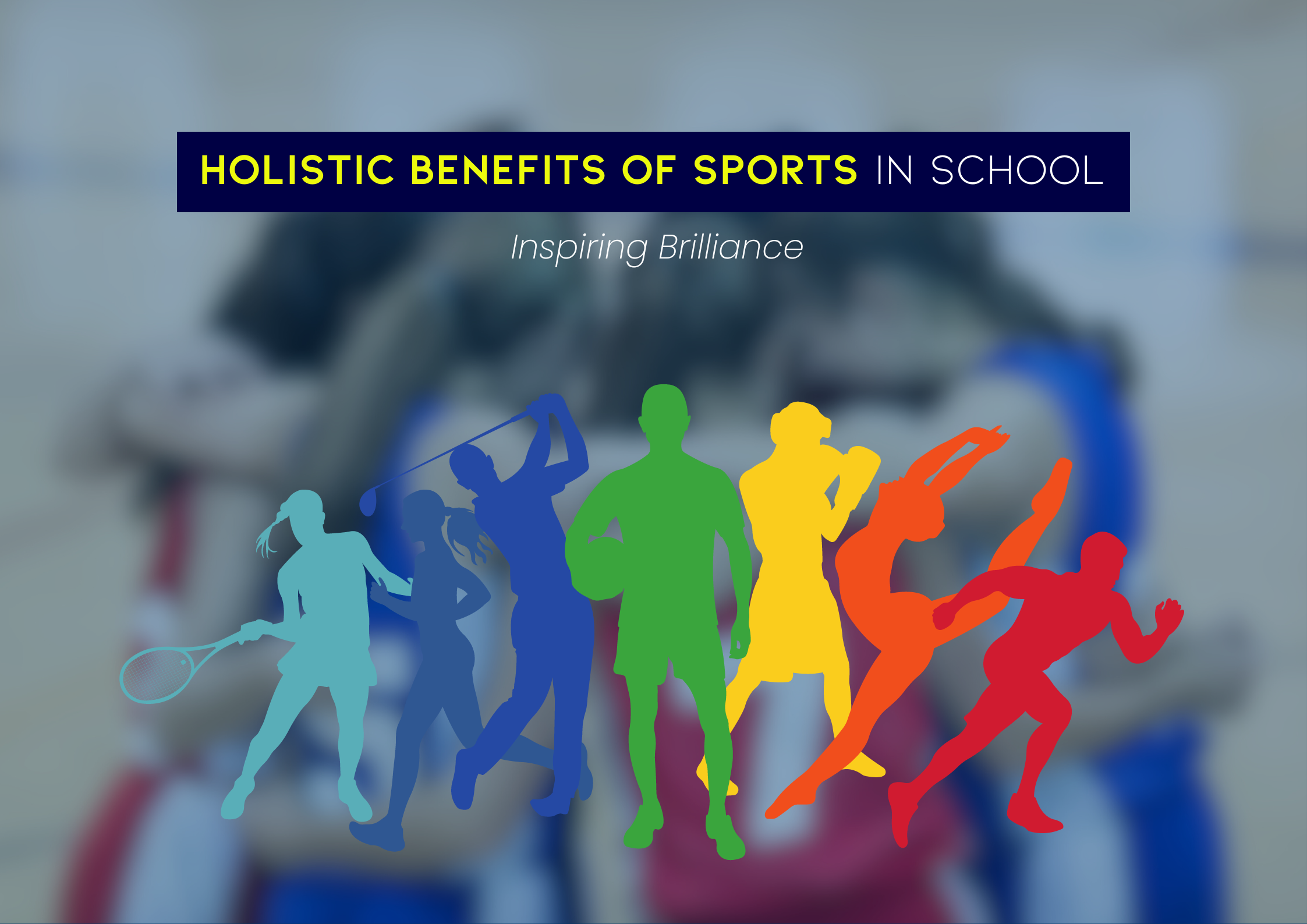Sports in school refers to the organized physical activities and competitions that students participate in within an educational setting. Beyond the conventional classroom learning, engaging in sports holds a pivotal role in fostering the holistic development of students.
This essay will delve into the holistic benefits of sports in school bring to students, addressing their physical health, mental well-being, social skills, academic performance, and character development. There are so many holistic benefits of sports.
Definition of Sports in School:

Holistic benefits of sports in school encompass a variety of activities, ranging from traditional team sports like football and basketball to individual pursuits like track and field. These activities are typically organized and supervised by educational institutions and form an integral part of the school curriculum.
Importance of Sports:

The significance of sports in schools goes beyond physical exercise; it plays a crucial role in shaping a student’s character and enhancing their overall well-being. By providing a platform for physical activity and healthy competition, sports contribute to a more rounded and resilient individual.
Holistic Benefits of sports:
The term “holistic” in this context emphasizes the comprehensive nature of the holistic benefits of sports in school. It refers to the positive impact on physical health, mental well-being, social skills, academic performance, and character development. By addressing various aspects of a student’s life, sports contribute to their overall growth and readiness for future challenges.
Physical Health Benefits
![]()
Improvement of Cardiovascular Health:
Engaging in sports promotes cardiovascular health by enhancing the efficiency of the heart and improving blood circulation. Regular physical activity through sports helps in maintaining a healthy weight, reducing the risk of heart diseases, and fostering overall well-being.
Development of Motor Skills and Coordination:
Participation in sports involves a variety of movements that contribute to the development of motor skills and coordination. Whether it’s running, jumping, throwing, or catching, these activities enhance a student’s physical capabilities and fine-tune their motor skills.
Promotion of a Healthy Lifestyle and Fitness Habits:
Incorporating sports into the school routine instills the importance of a healthy lifestyle. Students who engage in sports are more likely to adopt fitness habits that persist into adulthood. This early exposure to the benefits of an active lifestyle can have a lasting impact on their overall health.
Mental Health Benefits

Stress Relief and Reduction of Anxiety:
Physical activity, a fundamental component of sports, is known to reduce stress and anxiety levels. The release of endorphins during exercise acts as a natural stress-reliever, promoting mental well-being among students.
Enhancement of Mood and Overall Well-being:
Regular participation in sports has been linked to improved mood and a sense of well-being. The positive effects of physical activity extend beyond the immediate exercise session, contributing to a more positive outlook on life.
Building Resilience and Coping Skills:
In the realm of sports, students often encounter challenges and setbacks. Whether it’s losing a game or facing tough competition, these experiences contribute to the development of resilience and coping skills.
Learning to handle disappointments and setbacks in a controlled environment prepares students for similar challenges in other aspects of life.
Social Benefits

Teamwork and Collaboration:
Team sports, in particular, provide an excellent platform for learning the importance of teamwork and collaboration. Students participating in team activities learn to communicate effectively, coordinate with teammates, and appreciate the collective effort required for success.
Communication and Interpersonal Skills:
Engaging in sports fosters the development of communication and interpersonal skills. Students learn to express themselves clearly, listen to others, and work collaboratively towards common goals, skills that are crucial in various aspects of life.
Formation of Friendships and Social Bonds:
The camaraderie built through sports often leads to the formation of lasting friendships. The shared experiences, challenges, and victories contribute to the development of social bonds that extend beyond the sports field.
Academic Performance

Positive Impact on Concentration and Focus:
Studies have shown that regular physical activity, such as engagement in sports, positively influences concentration and focus. The increased blood flow to the brain during exercise enhances cognitive function, potentially leading to improved academic performance.
Time Management and Goal-Setting Skills:
Participating in sports necessitates effective time management. Students involved in sports learn to balance their academic responsibilities with training and competition schedules, honing valuable time management skills. Additionally, setting and working towards sports-related goals can translate into a positive approach towards academic goals.
Correlation Between Physical Activity and Academic Achievement:
Several studies have explored the correlation between physical activity and academic achievement. While the relationship is complex and multifaceted, evidence suggests that students who engage in regular physical activity, including sports, tend to perform better academically.
Character Development

Discipline and Self-Control:
Sports instill discipline and self-control as athletes adhere to training schedules, follow rules, and manage their behavior both on and off the field. These traits cultivated through sports contribute to the overall character development of students.
Leadership Skills and Responsibility:
Team sports often provide opportunities for students to take on leadership roles. Whether serving as team captains or guiding younger teammates, students develop leadership skills and a sense of responsibility, qualities that extend beyond the sports arena.
Learning to Handle Success and Failure Gracefully:
Success and failure are inherent aspects of sports. Students learn to handle victories with humility and losses with resilience. These experiences contribute to emotional maturity and a balanced approach to success and setbacks in other areas of life.
Holistic Development

Integration of Physical, Mental, and Social Aspects:
The holistic nature of sports lies in its ability to integrate physical, mental, and social aspects of a student’s life. While physical activity enhances health, the mental and social challenges in sports contribute to cognitive and emotional development.
Long-term Impact on Overall Personality and Life Skills:
The skills and values acquired through sports have a lasting impact on an individual’s overall personality. The ability to work in a team, manage stress, and exhibit discipline becomes an integral part of a student’s character, influencing their approach to life’s challenges.
Sports as a Tool for Character Building and Personal Growth:
Beyond the immediate physical and mental benefits, sports serve as a powerful tool for character building and personal growth. The challenges and triumphs experienced in sports contribute to the development of a well-rounded and resilient individual.
Challenges and Solutions

Addressing Issues Such as Academic Pressure and Time Constraints:
One challenge associated with sports in schools is finding a balance between academic pressures and sports participation. Schools need to implement strategies to manage this delicate balance, ensuring that students can reap the benefits of sports without compromising their academic responsibilities.
Ensuring Inclusivity and Access to Sports for All Students:
Another challenge is ensuring inclusivity, providing opportunities for all students to participate in sports regardless of their physical abilities or socioeconomic backgrounds. Schools should strive to create an inclusive sports culture that caters to diverse interests and abilities.
Balancing Sports with Other Extracurricular Activities:
Students often engage in various extracurricular activities alongside sports. Striking a balance between different commitments is essential to prevent burnout and ensure that students can explore a range of interests without feeling overwhelmed.
Conclusion
Emphasis on the Importance of Incorporating Sports:
Emphasizing the importance of incorporating sports into the educational system, it is crucial for schools to recognize the long-term benefits that sports bring to students.
The investment in sports programs not only contributes to the well-being of individual students but also creates a positive and dynamic school culture.
Encouragement for Schools:
The essay concludes with an holistic benefits of in schools to prioritize and invest in sports programs. Recognizing the holistic benefits, schools play a pivotal role in shaping the future of students by providing them with opportunities to engage in sports and harness the transformative power it holds.








